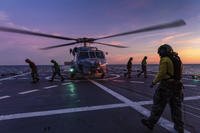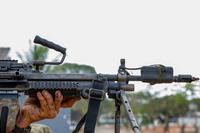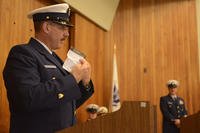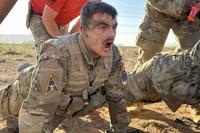
Hard to believe, I know, but here's a story from today's headlines at Military.com that's sure to get some of you all riled up:
In a move that could be the most enduring imprint of U.S. influence in the Arab world, American military officials in Baghdad have begun a crash program to outfit the entire Iraqi army with M-16 rifles.
The initiative marks a sharp break for a culture steeped in the traditions of the Soviet-era AK-47 Kalashnikov assault rifle, a symbol of revolutionary zeal and third-world simplicity that is ubiquitous among the militaries of the Middle East.
"We in the U.S. know that the M-16 is superior to the AK ... it's more durable," said Army Col. Stephen Scott, who's in charge of helping the Iraqi army get all the equipment it needs to outfit its forces.
"The Iraqis have embraced that ... and the fact that it is U.S. manufactured and supplied. They are very big on U.S.-produced [foreign military sales] materials," he said in an interview with military bloggers this month.
So far, the U.S. military has helped the Iraqi army purchase 43,000 rifles - a mix of full-stock M-16A2s and compact M-4 carbines. Another 50,000 rifles are currently on order, and the objective is to outfit the entire Iraqi army with 165,000 American rifles in a one-for-one replacement of the AK-47.
"Our goal is to give every Iraqi soldier an M-16A2 or an M-4," Scott said. "And as the Iraqi army grows, we will adjust."
Scott added the mass of AK-47s from various manufacturers floating through the Iraqi army's inventory could cause maintenance and reliability problems. Getting both U.S. and Iraqi forces on the same page when it comes to basic weaponry is part of the argument for M-16 outfitting.
"I'm also a fan of AKs," Scott said. "But keep in mind most of these AKs have been sitting around in bunkers or whatnot for 30 or 40 years [and] are in various stages of disrepair."
A variety of U.S. troops, including SEALs, Marines and Soldiers - and even civilian contractors - are training Iraqis on the M-16 and M-4 throughout the country. One civilian trainer told Military.com during a brief interview in Iraq that the Iraqi soldiers are a little behind the average American trooper when it comes to learning the various parts and breakdown of the M-16, but they're enthusiastic and quick learners on the range.
After seeing some of the firing range training himself, Scott added that he "asked the Iraqis how they liked the weapon and they said it was far superior, it was more accurate ... and more reliable."
"I think the transition is almost transparent from those older AKs," he said.
A system that registers each rifle with the individual who receives one that uses biometric data such as thumb prints and eye scans is meant to address concerns over U.S. weapons winding up in enemy hands. A July 2007 Government Accountability Office report concluded that as many as 190,000 weapons delivered to the Iraqi army were not accounted for and could've wound up in terrorist caches.
That's something Scott isn't going to allow on his watch.
"These Iraqi soldiers know that this weapon becomes part of their person," he said. "And they also know that they are responsible and accountable for that weapon."
And from the looks of it, Iraqi soldiers aren't willing to hand them over to the bad guys.
"Most of the soldiers think they will be just like the Americans, and that is making them very happy," said Capt. Rafaat Mejal Ahmed, the Iraqi 1st Division weapons and ammunition officer, in a Marine Corps release. "They think the modern technology will make them more powerful."
-- Christian







